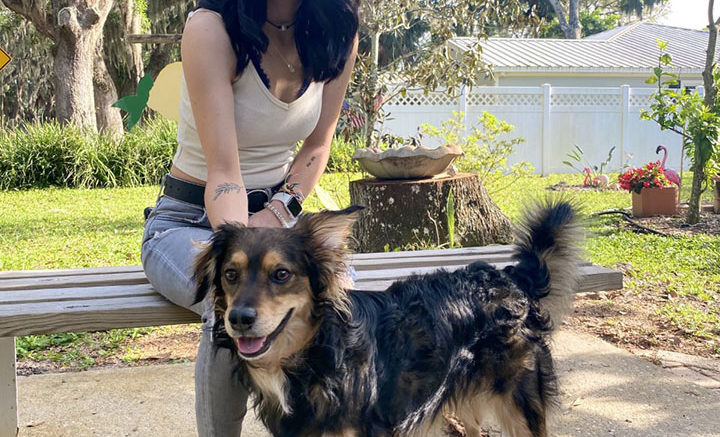By Maiya Mahoney
When it comes to healing and tough times, dogs may be the best medicine. A cure that comes with wagging tails and sloppy, wet kisses, many have turned to pet adoption during the global outbreak of COVID-19.
With social distancing guidelines leading to potentially less social interaction, many people have turned to pet adoption to alleviate stress and provide companionship. Emily Splane, associate psychology professor at Flagler College, provides insight into the human-canine bond.
“A chemical called Oxytocin is released to facilitate social bonds and is released when we have contact with others,” Splane said, “and that can be shared with an animal.”
In regards to the impact that pets have mentally on humans, Flagler student Taylor Stearns completed research with Dr. Angelina Semegon on the long-term benefits of service animals for those with post-traumatic stress disorder (PTSD).
“We found in our study that the presence of a service canine significantly reduced symptoms of PTSD in the participants in the study, specifically, overall health, ability to complete daily tasks, feeling hopeful about the future, coping with flashbacks, and being able to manage anxiety were all improved upon,” Stearns said.
While Stearns’ study focused on service animals, there is still evidence that pets do reduce stress in what is known as the ‘Pet Effect.’
“There’s an effect called Pet Effect, known as the human-animal bond and is essentially a mutually beneficial relationship between people and their pets that positively impacts the health and well being of both,” Stearns said. “Specifically, pets and therapy animals have shown to significantly reduce stress and help with other mental health related issues like anxiety and depression.”
In a time where people are called to keep their distance, the yearn for this bond is more apparent. Many Flagler students have taken it upon themselves to adopt during this time, such as Wesley Hobbs, Camryn Breasure and Meredith Mancuso. Hobbs and Breasure adopted Carver, a lab and pitbull mix from S.A.F.E. Pet Rescue in St. Augustine, Fla.
“We felt like having a dog by our side through this pandemic would help us get through it,” Hobbs said. “I wanted to give this dog a better life than the previous one he encountered.”
For Mancuso, one of her main reasons she adopted was to have a dog to keep her company. Although Mancuso had plans to adopt before COVID-19, the virus expedited her adoption process.
“I live by myself, and having a dog helps me from getting too lonely,” Mancuso said. “I have always had a dog growing up, and dogs have helped my mental health immensely as well. They’re great at making you feel loved, and help enforce responsibility.”
In a survey conducted by the American Psychological Association, 41.6% of college students have anxiety, while 36.4% experience depression.
“We as college students especially are feeling the stress during this time. I’m a senior about to graduate and I’m definitely concerned about not being able to work in quarantine. I do have student loans to pay off and if I can’t have a sustainable income in the next six months I’m definitely going to be in a bit of trouble,” Stearns said. “I definitely think with the research involving pets, pet therapies and college students, having your pet by your side during this lockdown would absolutely be beneficial.”



Be the first to comment on "Pets provide companionship during COVID-19"